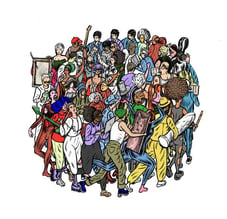On optimism - #362

A few weeks ago, a friend replied to my email about monoculture wondering why that essay (and the person who selected it) focuses so much on perceived shortcomings, flatness, and sameness, when there's so much diversity, creativity, and newness all around us? For ever example of few people wanting interesting degrees from their college, you can find experiments in higher education providing exactly that. For every corporate-inspired global aesthetic, you can find someone doing it entirely differently. My friend was right: Brink Lindsey sees a glass half-full, or perhaps sees things through his own funhouse mirror.
It's a non-unique criticism: we all see things in our own way. What my friend's email left me wondering is why do we buy in to narratives of decline?
By almost every conceivable measure things are better off today than they were in previous decades. People live longer, have more agency, and experience a treasure trove of materials delights. My home is centrally heated, gently cooled in the summer, has a newly unleaky roof, and every week is stocked with the finest of foods and wines. The millionaire of a hundred years ago would've had nothing on me, although his household staff was quite a bit larger. When I came of age, I got to choose where to attend to higher learning, where to live, and what career to try. When I changed my mind on all three, I was able to, with some time and money, reset things to my liking. Your average son of a blacksmith, two hundred years ago, would've become a blacksmith and moved into the shed out back. A few notable figures died this week at right around 100 years old; when my grandfather was born, in 1900, his live expectancy was 45 years old. (He suffered from a lifelong limp due to childhood polio, something literally no one born today will face.)
Even though I know all of the above, the idea that things are going downhill captures my attention. Why? Maybe it's because it's tough to see relative acceleration when you're moving. The supercomputer in our pockets today seem obvious, expected, and annoyingly likely to be just out of batteries when you need them. But even in my lifetime these things are surprisingly new: your average corporate HQ in the 1980s likely didn't have the processing power and data storage your average pants pocket does today. Yet what we notice is the battery about to die or the slight delay in the video loading or the ripples in society we discover people are just as bad, if not worse, living their social lives online.
Another theory, and this brings us to the reading today, is that our optimists are unbelievable. The first piece today, from an arts critic at the times, posits that the endless remixing and referencing of current culture is just fine: maybe innovation in form isn't what the arts should be, maybe a neo-classicism hearkening back to only the 20th century is exactly what the arts should be. This feels pretty thin.
The second piece, from your friendly neighborhood venture capitalist plutocrat, screams optimistically about technology being not just a solution to every problem, but the only possible solution. Don't get me wrong: I'm all for building things and progressing. But it's just a little connived and thin to spout, "Technology is the glory of human ambition and achievement, the spearhead of progress, and the realization of our potential," and expect people to throw a parade behind the technology flag. Lived experience tells us that technology is like the old saw about us Americans: we will do the right thing, but only after exhausting every other possibility.
Reading
Why Culture Has Come to a StandstillA Times critic argues that ours is the least innovative century for the arts in 500 years. That doesn't have to be a bad thing. |
|
The Techno-Optimist ManifestoWe are told that technology takes our jobs, reduces our wages, increases inequality, threatens our health, ruins the environment, degrades our society, corrupts our children, impairs our humanity, threatens our future, and is ever on the verge of ruining everything. We are being lied to. |
|
You live in a deranged age — more deranged than usual, because despite great scientific and technological advances, man has not the faintest idea of who he is or what he is doing.
-- Walker Percy

